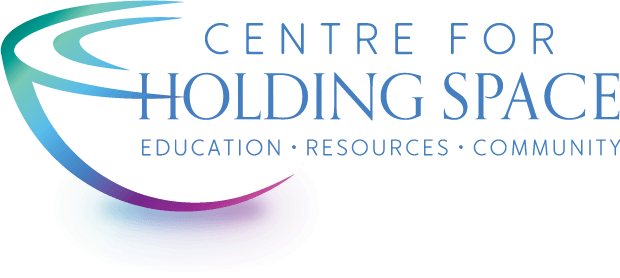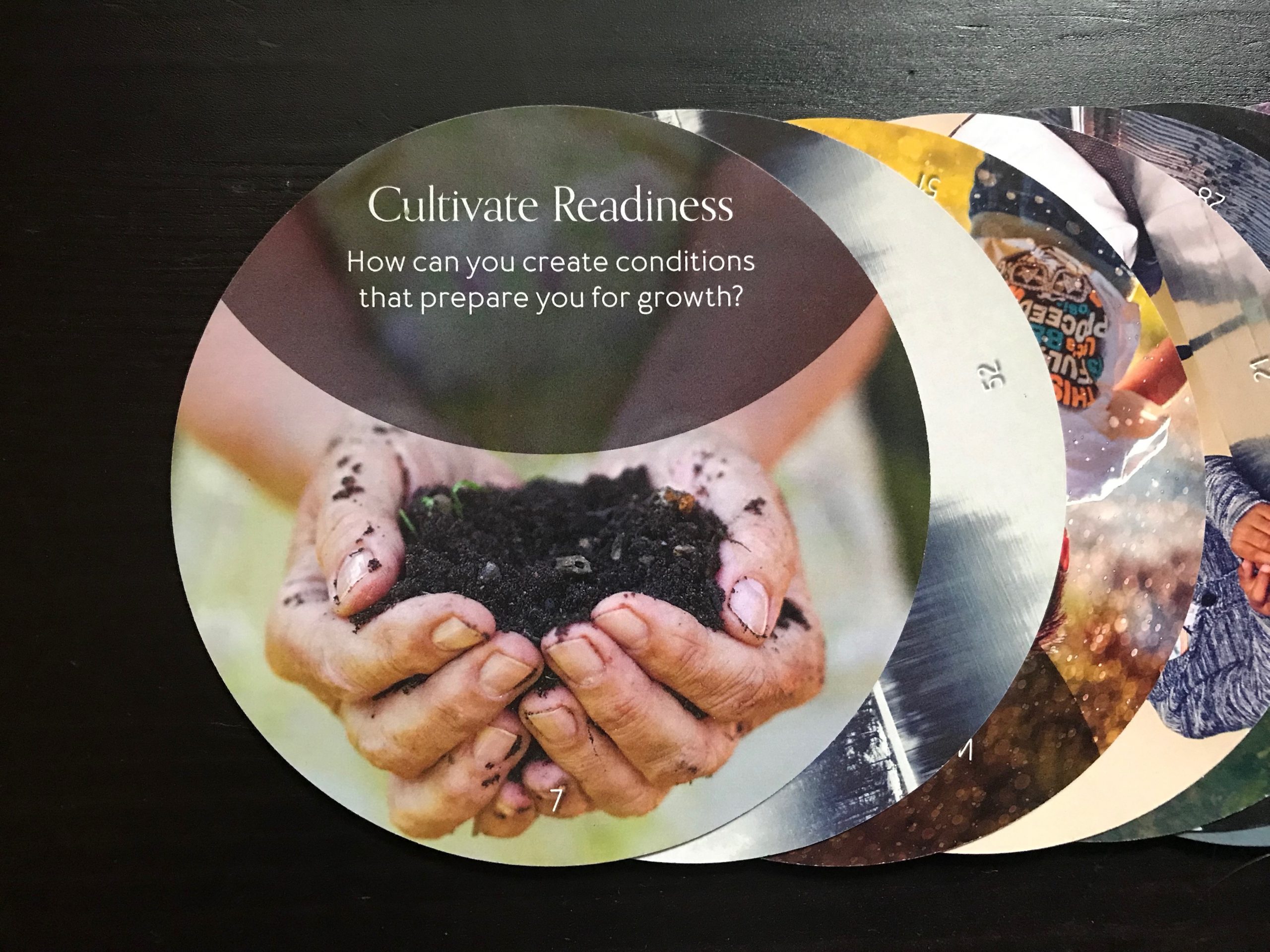(from the Holding Space Card Deck)
After George Floyd’s murder, there was a huge spike in the amount of money invested in diversity and inclusion work across the U.S. According to one study which surveyed HR professionals, 85% have expanded inclusion activities and 75% either started or enhanced unconscious bias training. A lot of people started having conversations and doing training that should have happened years ago.
Here in Canada, we’re feeling the reverberations of the discovery of over fifteen hundred unmarked graves on the sites of former residential schools (a number that is sure to rise), and it could very well mean that we follow behind the U.S. in a spike in investment in diversity and inclusion work and in hosting more and more hard conversations around racism, colonization and bias. I’ve spoken to church leaders, for example, who are feeling the impact (since many of the residential schools were run by churches) and who are trying to figure out how they can engage in meaningful conversations with people they lead.
While it’s disappointing that it takes many of us (especially people with power and privilege) so long to engage in these conversations, and it’s disappointing that so much trauma had to continue happening in the meantime (even though people have been shouting in the streets about it for decades), I want to hang onto some optimism that there seems to be a sea-shift happening and people are putting time and resources into meaningful change.
To be honest, though, I hold some tension between optimism and concern. I am hopeful that change is possible and people will continue to dig deeper and deeper into what it means to decolonize ourselves, our workplaces, our churches, our belief systems, our countries, etc. AND I am concerned that when we make choices out of our reactivity rather than our thoughtfulness, and when we rush into hiring diversity and inclusion specialists because of the public pressure to do so, we have the potential to do more harm than good (and, at best, only put a band-aid on a deep wound).
Decolonization and equity work takes time, intention, love, and commitment. It takes a willingness to be unsettled and disrupted. We can’t expect to resolve deeply embedded biases and social conditioning or to change systems that have white supremacy and patriarchy baked into them by hiring one DEI specialist or sending all of our employees to one workshop.
AND we can’t expect a DEI specialist to have any success in a workplace unless we have already worked to create an environment where people are prepared to have hard conversations and be confronted with uncomfortable truths. We’d be setting up such a specialist for failure (and possibly abuse) if we bring them into an environment where people are not prepared to sit with discomfort and wrestle with both their personal biases and the biases that are built into the system they’re propping up. Since many DEI specialists are from marginalized populations (people of colour, people with disabilities, people who are LGBTQ+, etc.), our efforts might actually perpetuate harm instead of repairing it.
We, as leaders, need to put more thought into readiness and the process of change and development in individuals and in communities.
Over the past year, as we’ve been developing the Certification Program for the Centre for Holding Space, I’ve been working with a small team in developing a tool that will support people in self-reflection over their personal growth in all aspects of holding space. For each category in our skills list (based on the 52 cards of the Holding Space Card Deck), we’ve developed a scale from one to five of how skilled a person feels they are in this specific area (from “I have no clue about this concept” to “I could teach this concept to others”). Each week for ten months, our small team has had a focused conversation about these five steps of personal development, how we move through them, how we’re sometimes triggered back to an earlier stage, and what supports us in our growth through the steps. This process has given me a lot of time to think about human development and what it takes to support people through it.
One of the conclusions I’ve come to in this work is that we, as leaders, influencers, parents, coaches, facilitators, pastors, etc., need to invest more intentionally in supporting ALL of the steps in people’s development process (or at least ensuring there is support available), and we can’t ignore that there ARE steps. Especially when it comes to important work like decolonization, we can’t assume that people are ready for the work unless we’ve put some effort into preparing them. (And, even before that, we have to do the work in preparing OURSELVES.) It’s like planting a garden – you don’t drop a seed onto soil that’s not prepared for it and expect that it will grow.
If you are considering what your people (and the system they’re in) are ready for, especially in terms of decolonization and equity work, here are some questions to ask yourself and your people:
•Is there receptivity in the group for exploring what is personal responsibility, what is collective responsibility, and what is built into the system (i.e. religious doctrines, organizational culture, hierarchical structure, etc.) that you’re part of?
•Are the leaders in your organization willing to be disrupted, or do they expect people beneath them in the hierarchical structure to change while they maintain the status quo? How much are they attached to what they’ve created and/or lead (especially if they are the founders of the organization)?
•Is there enough safety and trust built into the organizational/community culture that people are able to explore their personal biases without fear of retribution? Do people tend to open up to each other about their fumbles and failures, or is there a culture of guardedness?
•Is there enough openness in your culture to be able to name where power resides and how it is held? If there IS openness and transparency, is it conceivable that power could shift and/or be more equitably distributed?
•Do people understand things like cognitive dissonance and confirmation bias? Are they willing to explore where their beliefs and biases came from and why they cling to them, or do they shut down and get defended when their beliefs are challenged?
•Is there a culture of resilience and flexibility, or one of rigidity and hanging on to “the way things have always been done”? If it’s rigid, what would need to happen for it to evolve?
•Does there tend to be a lot of defensiveness and deflection of blame within your community, or are people generally willing to take responsibility for what is theirs and/or what they have the power to influence?
•How wide is the range of readiness in your community or workplace? Are there some who have done a lot of personal development (including decolonization, etc.) and some who have avoided it and/or make fun of it? If there is a wide range of readiness, do you have the resources to support people at all levels? Or will you be focusing your work on a specific level and encouraging others to find what they need elsewhere?
•Are there bullies in the culture that cause everyone in the community or organization to be on edge and cautious about what they reveal or what risks they take? How much power have those bullies been allowed to hold and what might you need to do to protect people from their bullying behaviour?
•How comfortable are people with boundaries and how well do they respect them? Is it a culture of enmeshment and codependency, or is there mutual sovereignty where people respect each other’s autonomy and right to make their own choices?
•Have you developed conversational processes that support people in having hard conversations or do you simply leave it up to chance? Do you have enough guardrails and agreements in place that people know how to show up for the conversations and know what to expect in the space?
•Is there understanding and compassion around things like trauma, mental illness and neurodivergence within your community or organization? Are there people who know how to support those with trauma, or do you have resources available to you for such support? If, in the middle of a hard conversation, someone gets triggered, how might it be held in the collective and would the person be shamed for it?
This is just a start in determining the readiness of your community or organization. You may want to reflect on these questions within your leadership team first, or you might want to invite people in your community to reflect on their own readiness (and the collective readiness) before you decide on what course of action to take. (First ask yourself WHO would be ready for such reflection and don’t make assumptions that everyone is.)
If you find this list overwhelming, and you just don’t know where to start, we might be able to help you at the Centre for Holding Space. A starting point might be to enroll in our next offering of the Holding Space Foundation Program (it starts in October and registration is now open). In that program, you’ll deepen your own practice of holding space for others and for yourself, and then you’ll learn about what it means to hold collective space and how to begin to hold space in complexity (where there might be conflict, imbalances of power and privilege, etc.).
Beyond that, we’d also be happy to have a conversation with you about how we can support you in developing your community’s readiness. Some of the workshops we’ve already created (for example, Holding Space in Times of Disruption and Overwhelm) can be adapted for your community, and we can further tailor work around preparing for decolonization and equity conversations. We’ll also be developing some specialized courses and webinars for organizational leaders, church leaders, educators, etc. (Reach out to us if you have specific interests or requests.)
P.S. As a starting point, you might want to share the PDF in this post, about how to process uncomfortable information, with the people in your community.

